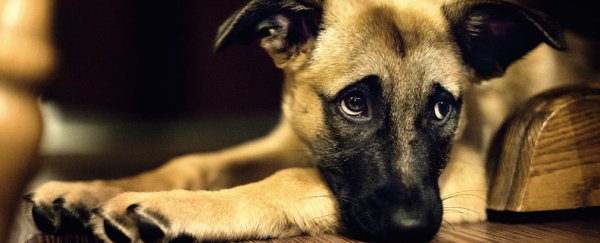Dog shaming is a popular online trend. Heck, there's a whole Tumblr devoted to it. But just because people enjoy taking photos of their pets in morally compromising positions after 'naughty' behaviour doesn't mean the animals are necessarily remorseful for the transgression.
According to veterinary scientist Susan Hazel, the fact that dogs may look ashamed to us after we've caught them doing something bad says a lot more about our relationships with our pets than it does about their ability to feel complicated emotions such as guilt.
"There's been a number of studies done and it's pretty clear that dogs don't feel or display guilt," Hazel told Simon Royal at the ABC. "It's not the way their brains work."
According to Hazel, any appearance of guilt or contrition in dogs is the result of the animals having adapted to live with humans over thousands of years – basically, they've learned to act in a submissive way when their masters express anger or glower downwards at them.
"Dogs will show appeasement-like behaviour that some owners interpret as guilt," Hazel said. "They will also react to the person's body language, so dogs are absolute geniuses at picking up what we think before even we know it."
The most widely cited research that supports this view was conducted by Alexandra Horowitz, a psychologist and canine expert who runs the Horowitz Dog Cognition Lab at Columbia University in the US. Her 2009 study recorded interactions between owners and dogs after the animals had been left alone in a room with treats.
Horowitz varied the results in the experiment, sometimes letting the dog eat the treat once the owner was gone; other times removing the treat but telling the owner the dog had eaten it anyway. As she later explained in The Washington Post, the filmed interactions between dogs and owners were revealing:
"The problem is, the 'guilty look' is not what it seems. A dog may plaster his ears against his head, turn away, wag his tail low between his legs or just take off when accused of a misdeed. But in research I did where owners confronted dogs both guilty and innocent of eating a forbidden treat, I found one clear result: The 'look' happened most when dogs saw scolding, questioning or angry owners, whether the dog was guilty or not." … The 'guilty look' would be better called the 'submissive look', as in, 'Don't punish me for whatever it is you think I did.'"
Regardless of whether we mistakenly attribute guilt or shame to our beloved dogs (or end up taking silly photos of the results), the one thing owners need to look out for, says Hazel, is any sign of genuine distress in our pets.
"About 20 percent of dogs suffer from separation anxiety and that often leads to all sorts of behaviour, like chewing up the sofa, which ends up as dog shaming," she said. "Other people see it as something a bit funny, but I see a dog that's in a fair bit of distress and actually needs some help. If they don't get it, then that's a problem."

